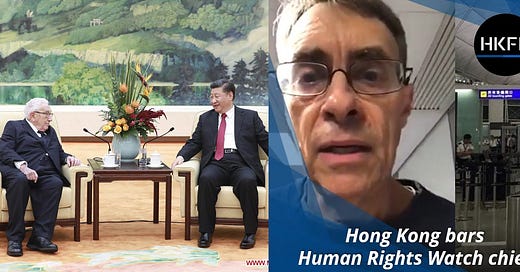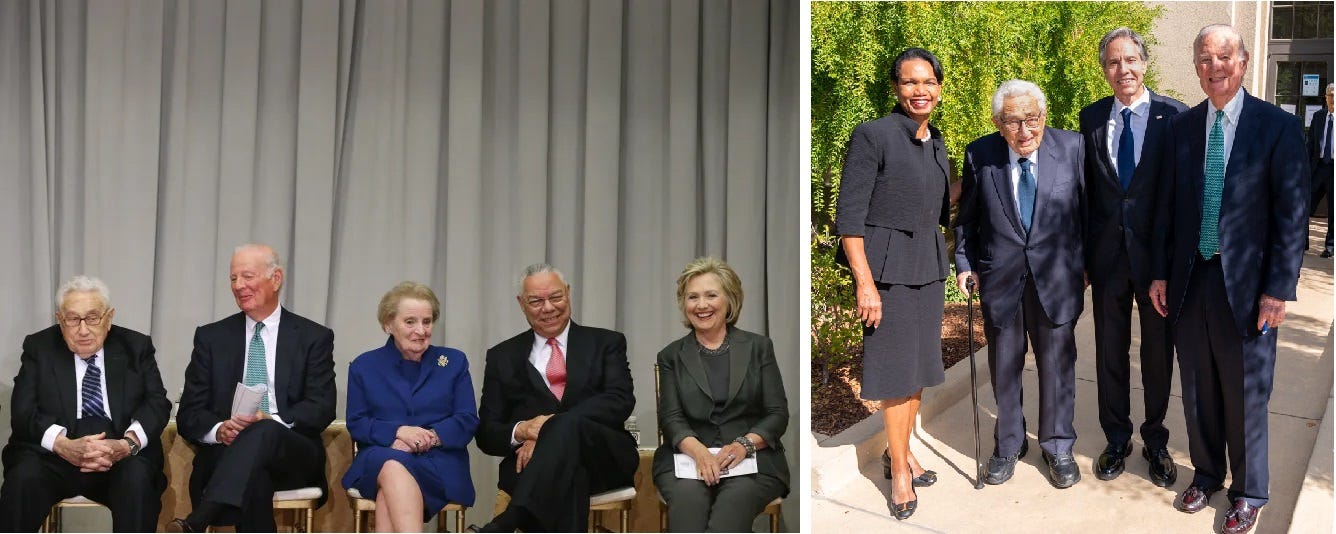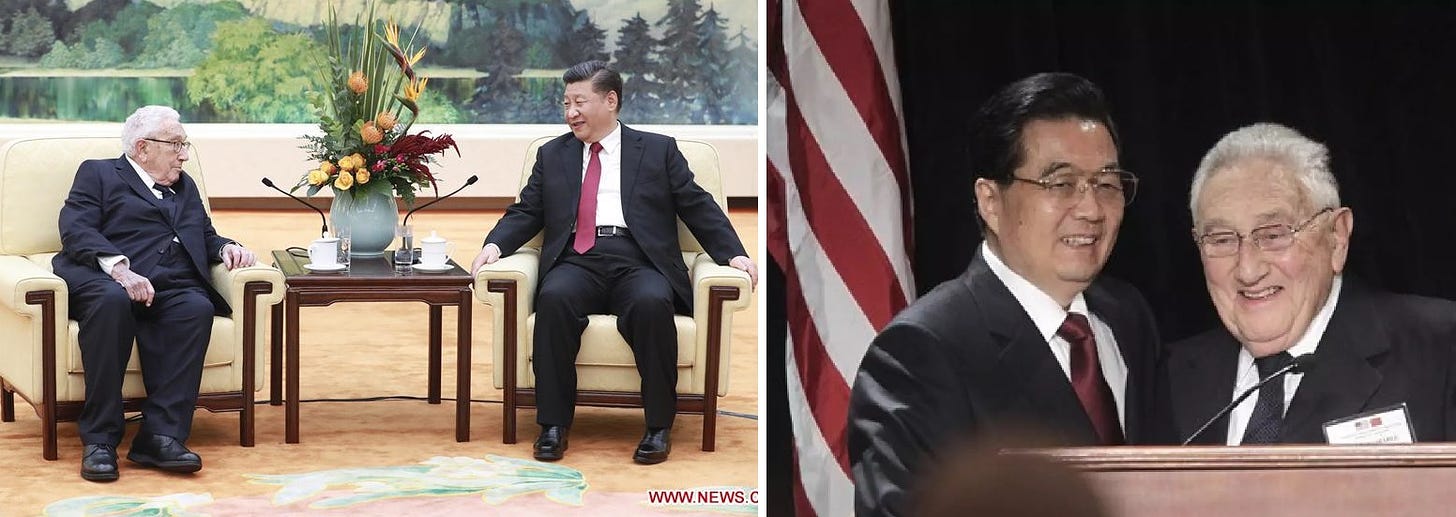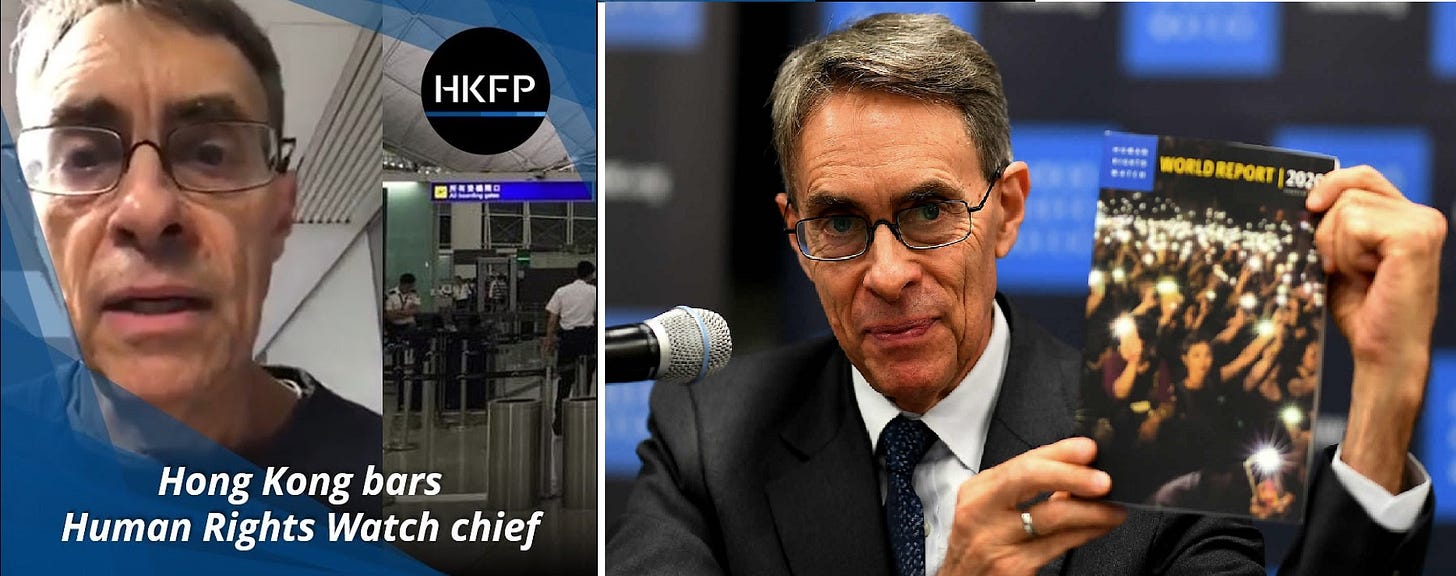Kissinger, Roth and the monetization of foreign policy
Two cases show how monied interests serve to downgrade human rights concerns
Henry Kissinger and Ken Roth. Two men who have worked much of their careers to influence United States foreign policy. Both men have degrees from Ivy League institutions: Kissinger from Harvard and Roth from Brown and Yale. They have similar origins. Kissinger was a Jew who fled Germany to avoid persecution, as did Roth’s father.
Why I am I comparing these two men? It started with my intent to write a piece on Kissinger that began with the line: The most concise remark I can make about the death of Henry Kissinger is that two million Bangladeshis were unavailable to read his obituary.[1]
Copious obituaries were written indeed, despite the fact that Kissinger’s policies meant there were fewer people in the world to read about what a wonderful statesman he was.
Fortunately, Ken Roth is very much alive and productive. Both during his 35-year career at Human Rights Watch and since his retirement from the organization in 2022, he has worked to confront and reverse the legacy that Kissinger bequeathed to us, among so many unmarked graves.
The prompt for this comparison also comes from Professor Dan Drezner’s take, entitled “Henry Kissinger's One Real Foreign Policy Innovation.” He writes that “Kissinger figured out before anyone else was how to monetize his career in public service, and he excelled at that.” Drezner quotes from his own book, “The Ideas Industry:”
“The traditional route for ex-policy principals was to take a sinecure at a think tank. A successful for-profit consultancy, however, is far more lucrative than a think-tank fellowship. Henry Kissinger pioneered this approach in 1982 when he and Brent Scowcroft founded Kissinger Associates to offer advisory services for corporate clients.”
Drezner further writes that:
“Kissinger’s selling point to clients was his access to the corridors of power — not just in Washington, but Beijing. This also explains why Kissinger has resisted the hawkish turn in U.S. foreign policy towards Russia and China; such a turn threatens his privileged access to world leaders.”
Kissinger carved out a role as intermediary between the Chinese and U.S. officials, providing what became an exclusive service at times when bilateral tensions were not conducive to direct dialogue. There is nothing surprising nor inherently wrong here. Kissinger had stature as a former Secretary of State and National Security Advisor.
The problem was that Kissinger the go-between and Kissinger the head of Kissinger Associates were the same person. When he carried messages back and forth to Beijing he was doing so with a personal financial interest in how those messages were conveyed and received. He was selfishly motivated to tell his interlocutors things that would keep both sides reliant on him to keep conveying messages. And that mattered.
Let’s say U.S. officials are considering tough responses to a Chinese crackdown on human rights. When Kissinger goes to meet Chinese officials, is he going to tell them to stop the crackdown to avoid the penalties, or is he going to strategically advise them how to deflect the criticism to keep the “relationship” on track? Which message do you think the Chinese officials prefer to hear? And which approach do you think his clients keep him on retainer for?
Kissinger’s successors as Secretaries of State issued volumes of stern statements and reports about the Chinese government’s massive failures to respect human rights. But they were also eager to seek Kissinger’s counsel and proximity. If you’re a Chinese official trying to gauge whether to take America’s human rights censures seriously, those Kissinger photo-ops certainly look like a wink to a no.
By contrast, I cannot find any photos via a Google image search of Ken Roth with any of the nine Secretaries of State in office when he was head of Human Rights Watch. It’s not like Roth wasn’t given access to power. But by his own admission he seems to have been a token. The Obama White House invited Roth to attend a State dinner with Chinese leader Hu Jintao in 2011. Roth recounted his discussions with the Chinese ambassador at an event where he acknowledged he was “being used as a symbol.”
Kissinger’s access to China was never in question, as far as I can tell. His last visit was in July 2023, where he was welcomed as an “old friend” by Communist Party boss Xi Jinping. Roth was the opposite. I don’t know if Roth ever visited the People’s Republic of China, but in 2020 he was banned by authorities from entering Hong Kong on a planned trip. Further, with Roth as Executive Director, Human Rights Watch was sanctioned by the Chinese government because of links to the Hong Kong democracy movement.
Kissinger received a large number of honorary degrees and awards over his career. If these institutions gave any consideration to the propriety of honoring a man with a record of abetting crimes against humanity, it was not an impediment.
For the post-leadership phase of his career, Roth chose a think-tank fellowship, which Drezner notes is less lucrative than a consulting business. But even that was not safe from the fangs of monied interests. While Harvard lauded Kissinger’s return to Harvard despite his human rights aversion, it acted to reject Roth specifically because of his human rights advocacy. In 2023, Harvard Kennedy School's Carr Center for Human Rights Policy withdrew an offer of a fellowship to Roth. He said that he was denied due to his criticism of the Israeli government’s human rights record (something the head of Human Rights Watch was professionally obligated to do!). He further said that the Kennedy School’s dean had capitulated to Harvard's donors who are strong supporters of Israel. There was outrage by civil society groups on free speech and academic freedom grounds. The Kennedy School denied the accusations and reoffered him the fellowship.
Subsequent events lend credence to Roth’s claims. Witness the recent tumult over the firing of two Ivy League presidents following pressure from Members of Congress, who set aside any notion of governmental respect for academic freedom in order to accuse the institutions of being insufficiently militant against antisemitism at a time when the House of Representatives was using its official proceedings (erroneously and dangerously) to conflate criticism of the Israeli government with antisemitism.
Kissinger and Roth show contrasting examples of how monied interest diminish the role of human rights in foreign policy discussions. In Kissinger’s case, his clients’ money was an incentive to keep human rights off the agenda. In Roth’s case, the university’s donors’ money threatened to keep human rights off the agenda.
For Roth, a values-based intervention worked. Harvard backed down when confronted with appeals to principle, fearing reputational damage. But with Kissinger, the Secretaries of State knew going in that human rights would be excluded from his agenda but chose to rely on him anyway. That’s a deliberate choice that downgrades human rights in contravention of stated U.S. policy vis-à-vis China.
I’m not naïve. Money and politics have always been conjoined twins. But to the extent we desire to elevate human rights principles like freedom of expression and academic freedom beyond the realm where financial interests can sully them, we must be vigilant and insist on transparency and accountability.
[1] I highly recommend Gary Bass’ book “The Blood Telegram: Nixon, Kissinger, and a Forgotten Genocide,” which gives a detailed look at Nixon and Kissinger’s complicity.






